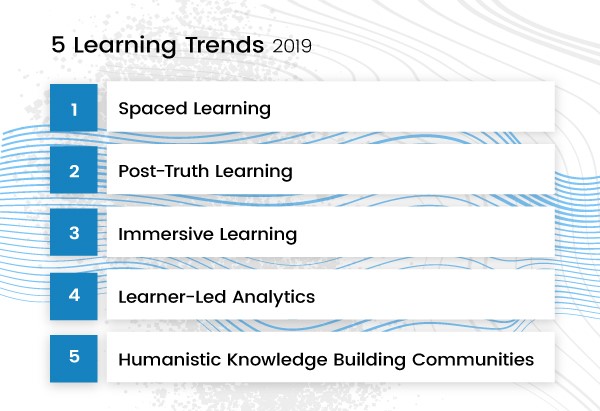Shaped by technology, new advances and alternative ways of thinking; the way we learn is changing. Teachingabroaddirect.co.uk pulled highlights from a report by the Open University to show how learning has evolved
-
Spaced Learning
In terms of memory (both short and long-term) we learn best in a series of short learning sessions. This is the reason why Spaced Learning is popular. Typically, with spaced learning, individuals are encouraged to study for a 20-minute period, followed by a 10-minute break when the learner will engage in related activity (putting the learning into practice.) This is repeated with the focus on recall, where the learner will apply their learnt knowledge.
This technique is particularly useful in breaking down technical and boring learning into small, manageable pieces. The process of learning, reflection, repetition and application can help people rapidly learn new skills and retain information too.
Tip: Gamification is an effective way to introduce the concept of Spaced Learning.
-
Post-Truth Learning
To combat the fake news epidemic, people are seeking out information that is reported responsibly and accurately. How do we know what information to trust? What sources to trust? The questions we are beginning to ask fall under the umbrella ‘epistemic cognition’ which basically means knowledge about knowledge.
Epistemic cognition refers to knowledge about important, fundamental concerns around objectivity, subjectivity, rationality and of course, truth. At the root, it is about encouraging people to question, rather than to blindly accept what is fed to them.
This is important in the current world because people get their information from endless sources – be it traditional media, social networks, blogs or apps. It is essential learners begin to take a critical, analytical approach to information gathering.
Tip: Make challenging assumptions a positive in the learning environment.
-
Immersive Learning
Using innovative technologies such as augmented reality (AR), virtual reality (VR) and mixed reality (MR), the concept of Immersive Learning allows individuals to experience realistic scenarios which make for an interactive and memorable learning experience.
Immersive Learning is about experience and exploration. It enables people to put into practice existing skills and knowledge in a dynamic environment, while creating a safe space to try out new skills and knowledge. However, due to cost and lack of understanding, the implementation of Immersive Learning is still in its preliminary stages.
Tip: Identify where you think an immersive experience will help individuals to learn most.
-
Learner-Led Analytics
Using algorithms to determine the best, most targeted path for individuals to learn, Learner-Led Analytics is a far more personalised route to learning. By using data to identify goals and ambitions, learners can monitor their own performance and gain a deeper understanding of how and why they learn.
Learner-Led Analytics is effective in creating a learner who is engaged and confident in what they are trying to achieve. It can also be used to identify an individual’s key skills and where learners may need help and further teaching.
Tip: Be prepared to put learning in the hands of the individual.
-
Humanistic Knowledge Building Communities
Humanistic knowledge building communities promote the development of knowledge, both individually and collectively. The humanistic element focuses on helping people to be creative, self-directed and open to experience. Whereas, the knowledge-building element focuses on enhancing and sharing knowledge.
Research suggests this combined approach will enable learners to develop their knowledge and themselves in a way that is transformative.
In terms of learning, practises such as working out loud circles and other initiatives around ‘show your work’ are a fantastic way to start building your own community and to support and encourage individuals to be visible in sharing what they know.
https://www.teachingabroaddirect.co.uk/
Full report: Trends in Learning 2018’












